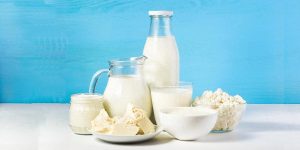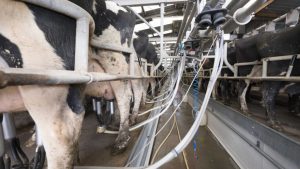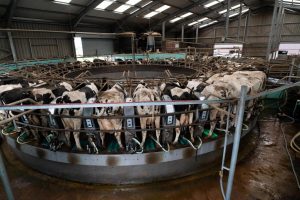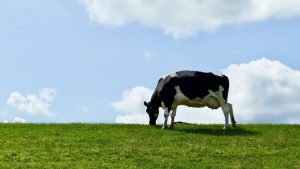
Organic dairy, for so long the sector’s success story, is facing a crisis of confidence, with fears about whether people will keep buying organic milk, butter and cheese as food prices soar.
Some UK organic farmers are being paid a milk price that is lower than the price some of their non-organic competitors get.
On-farm costs have been spiralling. Organic feed prices have tripled year on year thanks to high shipping costs dating back to disruption from the pandemic hiking the price of commodities such as organic soy coming from Asia.
The sector has recorded little growth in sales in the UK over the past five years. Overall, organic dairy sales are smaller (1% of cheese and 5% of milk) compared with European countries such as France or Germany. In Denmark, more than one-third of milk sales are organic.
Retailers say organic milk and dairy is struggling to stand out to consumers, on shelves crammed with a host of new standards and commitments being rolled out by conventional milk brands and producers, such as claims of “free-range” cows. There is also stiff competition from alternative milks, with sales of oat, almond and soy milk rising fast.
Unsurprisingly, there have been reports of producers ditching their organic status and moving over to claim a higher milk price as a conventional farmer. “Others will be looking too,” said a dairy farmer at a recent industry event.
Tim Downes, an organic dairy farmer in Shropshire, said the difference between milk prices and feed costs was “untenable” at the moment and predicted organic milk buyers would be short of milk soon, with farmers either switching to conventional or producing less.
“We’ve got to be positive in our messaging as organic farmers and let consumers know how much effort goes into making organic food,” he said.
David Williams, the chief executive of the Organic Milk Suppliers Co-operative, said: “Organic needs to be 10p per litre more [than milk produced by cows in conventional farming systems], but the challenge is convincing our customers’ customers to pick it off the shelf.”
The point of difference for organic appears to have been eroded as the dairy sector as a whole commits to many of the initiatives that previously appeared unique to organic, such as eliminating antibiotic use, giving cows access to outdoor grazing and trialling out carbon audits.
There is also likely to be a decline in the use of artificial fertiliser by all dairy farmers this year – another key part of organic farming standards – as the cost rises.
“You could question what the significant selling point of organic is any more,” said one industry insider this week. “As food prices go up, consumers are driven to keep the cost of their food basket down to whatever they wish to pay. Why should they fork out extra for it?”
Williams, whose cooperative represents almost two-thirds of milk produced by organic farmers in the UK, said organic’s selling point was its farmers’ work to protect wildlife and the environment. He said the standards, including not using artificial fertiliser or antibiotics, were certified, with farms audited annually to ensure they comply.
However, Williams said organic products and brands needed to do better at selling their credentials. “Organic looks too much like conventional [on the shelf in its current packaging]. We should not be surprised that consumers are not so interested in paying more for it.”
In the long-term, organic farmers need to be able to reduce their reliance on imported feed, said Liz Bowles, the farming director at the Soil Association, an organic farming charity.
“We need to get more of the animal feed used by farmers from the UK, through greater use of homegrown proteins such as peas and beans and making sure cows are eating mostly a diet from grass and forage,” she said.
Dan Burdett, a Sussex-based organic dairy farmer, said the crunch time for many organic farmers would be this autumn and winter when feed usage was higher with less grass growth.
“We’ve been organic here on the farm for 22 years [when his father converted from conventional] and I’ve never known anything else myself so it’d be hard for us to switch out now.”
























